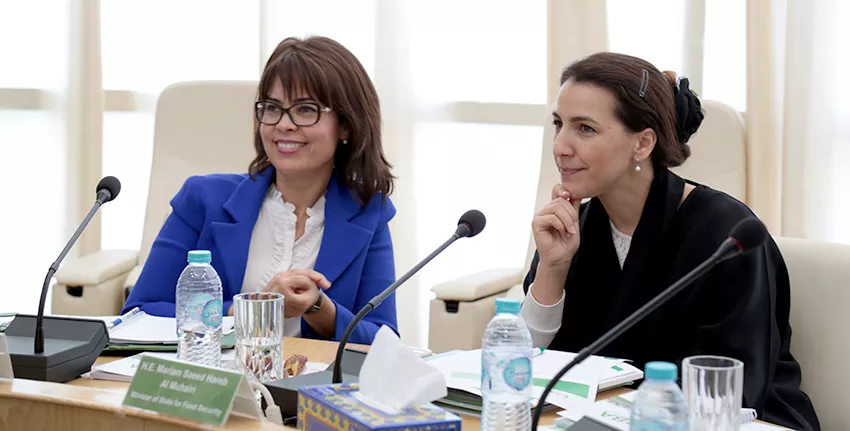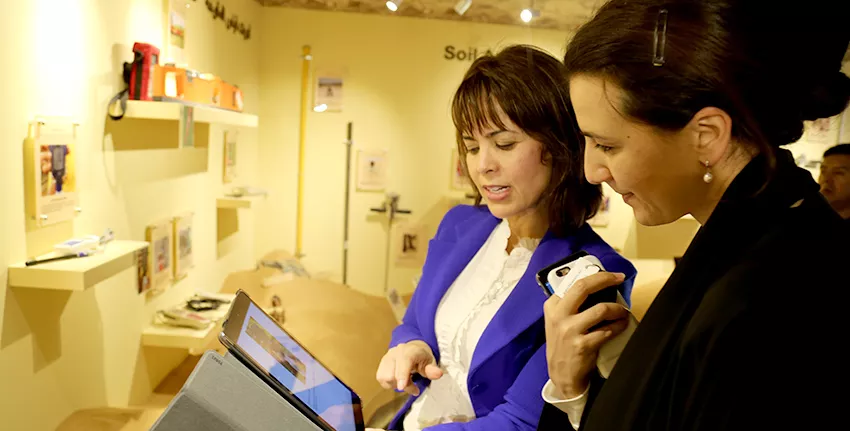UAE Minister of State for Food Security visits ICBA to discuss collaboration
5 November 2017
The International Center for Biosaline Agriculture (ICBA) welcomed Her Excellency Mariam bint Hareb Al Mehairi, Minister of State, on a special visit to introduce the center’s functions and contributions to the advancement of biosaline agriculture, notably in the field of food security, in line with UAE Government’s strategy.
During the visit, HE Mariam Al Mehairi met Dr. Ismahane Elouafi, Director General of ICBA, as well the senior management and scientists of the center. Al Mehairi was briefed about ICBA’s research-for-development initiatives in such areas as aquaculture and bioenergy, climate change adaptation, natural resources management, crop productivity and diversification, and policy analysis.
Speaking of her visit, HE Mariam Al Mehairi said: “Future food security is one of the top priorities in the UAE’s strategy. I am working with a team of experts to gather valuable data from across the UAE and to assess the current and potential needs in order to put forward a comprehensive strategy.”
“The research projects that ICBA undertakes in this field are very promising. When I look at the research, technologies, innovations, and incubators, I really see that food security is a theme that is taken into consideration in all their research projects,” Her Excellency added.
For her part, Dr. Ismahane Elouafi said: “We are delighted to showcase ICBA’s achievements to Her Excellency the Minister of State. As a top priority in the 2030 Global Development Agenda, food security is at the core of ICBA’s research-for-development work and programs. We are looking forward to joining forces with HE Mariam Al Mehairi to step up the delivery of our solutions to marginal environments.”
Following the meeting, Al Mehairi also toured ICBA’s facilities, including the Emirates Soil Museum, the Integrated Aqua-Agriculture System, experimental fields, wastewater treatment plots, biochar production sites, greenhouses and net-houses.
As an applied agricultural research center, ICBA has been working to address current and future risks and problems in marginal areas. Over the past two decades the center has been identifying, testing and piloting resource-efficient, climate-smart crops and technologies in salt-affected, water-scarce and drought-vulnerable regions around the world. As a result, ICBA has accumulated extensive applied experience and developed tailor-made solutions to the problems of salinity, water scarcity and drought. The center is uniquely positioned to introduce much-needed climate-smart crops and technologies in different parts of the world to alleviate projected food and water crises.
The center stores one of the world’s largest collections of germplasm exclusively dedicated to heat- and salt-tolerant plant species. Its gene bank has over 13,000 accessions of some 240 plant species from more than 150 countries and territories of the world. The gene bank also preserves around 250 seed samples of 70 wild plant species from the UAE, the center’s host country.
ICBA’s research-for-development work is focused on regions where agriculture is affected by, among other things, salinity, water scarcity and drought.
A number of future collaboration opportunities were discussed during the visit, including the proposal to establish an innovation park for promising technologies such as those for generating atmospheric water (air to water), which can produce between 1,836 to 2,295 liters a day under the UAE conditions, and a UAE agribusiness incubator platform.












